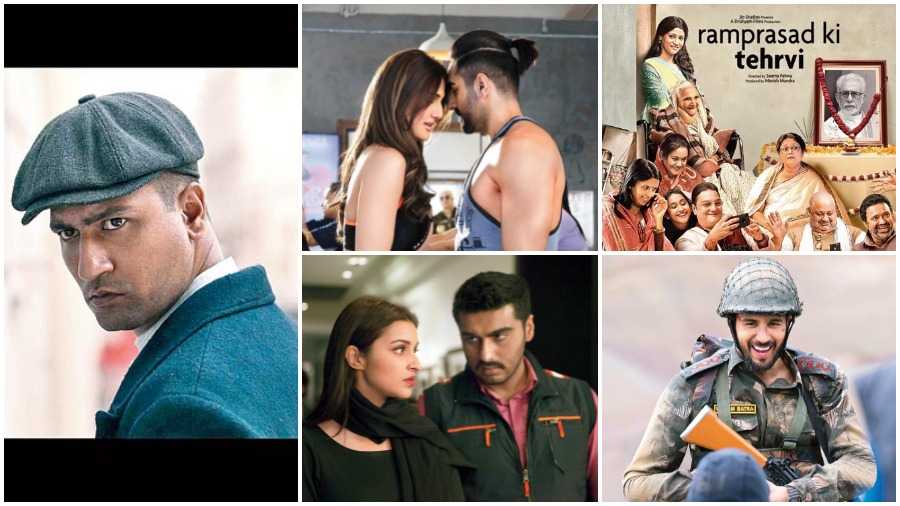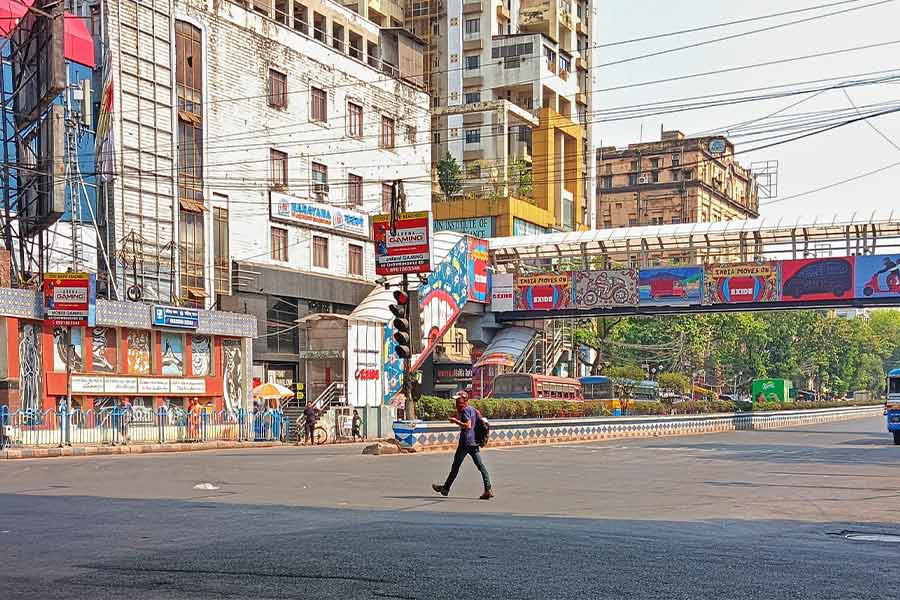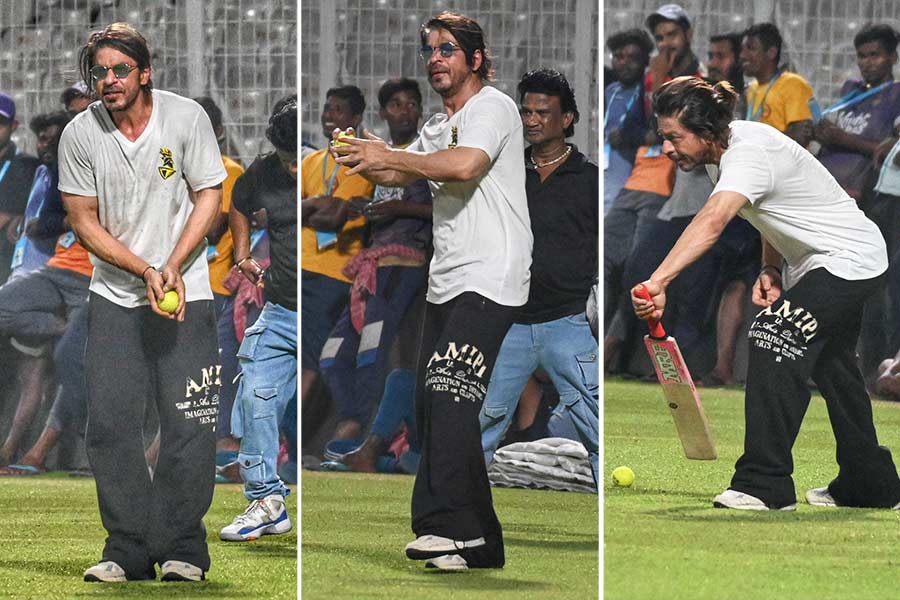Sardar Udham
That image of Vicky Kaushal’s vacant eyes — who was exemplary as Udham Singh, in what is, undoubtedly, one of the best performances of the year — as he tirelessly push-carted the bloodied bodies of the Jallianwala Bagh victims, will haunt us for years. Shoojit Sircar’s passion project (the film-maker had been living with the story of Udham for over two decades) turned out to be a masterclass in movie making, which, substituting scream with silence, traced the quiet but determined evolution of a revolutionary.
Sircar, known to throw a curveball even while operating within traditional genre tropes, told his compelling story in a slow-burn non-linear fashion, with Sardar Udham taking a significant step forward to not only highlight our heroes and history beyond the limits of a footnote in a school textbook, but also often, through mood and moment, action and reaction, using our past to mirror our present.
Chandigarh Kare Aashiqui
Using humour to make a tricky subject acceptable and accessible is never easy. But Chandigarh Kare Aashiqui — aided by empathy and sensitivity — managed to emphatically spotlight a demographic it either brushes aside or mostly parodies — the LGBTQ community, particularly trans people — and bring it into the mainstream. Chandigarh Kare Aashiqui benefited immensely from the presence of Ayushmann Khurrana, who as director Abhishek Kapoor told t2 is “a champion of films like this”, but the film well and truly belonged to Vaani Kapoor who uninhibitedly took on the role of a trans woman, and fearlessly made it her own. The film had its fair share of problems — it often reinforced the stereotypes it sought to challenge — but overall, Chandigarh Kare Aashiqui is a film that needs to be lauded. For daring to be different.
Ramprasad Ki Tehrvi
I watched Ramprasad Ki Tehrvi at the Mumbai Film Festival in 2019, but it saw the light in theatres — with much of 2020 on a pandemic pause — only in January this year. With a death in a small-town family forming its core, Ramprasad Ki Tehrvi that marked the directorial debut of actor Seema Pahwa, had a lot in common with Pagglait (there was definitely some finger-pointing and loud murmurs of the ‘P’ word), including some powerful performances from its eclectic cast (Konkona Sensharma to Vikrant Massey, Supriya Pathak to Vinay Pathak, Manoj Pahwa to Parambrata Chattopadhyay) and the way in which it sharply excavated the dynamics within a family and looked at death through a tragi-comic lens. Small-town quirks to a lived-in feel, this film nailed much of what it set out to, enabling us to forgive some of its cliches and contrivances.
Shershaah
A straight-to-streaming release may have robbed viewers of the larger-than-life experience of watching the battle scenes being played out on the hilly slopes of Kargil, but it’s the emotional heft of Shershaah that left a more indelible mark. Sidharth Malhotra — in what is perhaps the actor’s best turn in his almost decade-long career — slipped into the uniform of Vikram Batra, the real-life Kargil braveheart who defined daredevilry both in life and death and whose famous “Yeh dil maange more” singlehandedly elevated a soft drink slogan into a national war cry.
Director Vishnuvardhan adopted a Lakshya-like trajectory to show the other side of Batra’s life in the first half — redeemed solely by the soulful strains of Ranjha and Raataan Lambiyan and Kiara Advani’s refreshing presence — but Shershaah became the film it is in Half Two, when the action well and truly kicked in. A rare film about patriotism that didn't thump its chest, but filled our hearts, both with pride and pain.
Sandeep Aur Pinky Faraar
Sandeep Aur Pinky Faraar earned praise and kick-started conversations with its streaming release in May. Dibakar Banerjee’s film not only cast a nuanced eye on political powerplay and class and caste schisms in the northern belt of the country, but also subverted themes and tropes, including the gender flip of its protagonists’ names (Arjun Kapoor was Pinky, Parineeti Chopra was called Sandeep). Two diverse worlds collided in Banerjee’s film, which had its protagonists — as different as chalk and cheese — on the run together, yoked together by circumstances beyond their control. Crony capitalism to toxic masculinity to gender conditioning, Sandeep Aur Pinky Faraar did well in highlighting a variety of threads. What stood out at the end was that potent scene of Pinky embracing his feminine side (Arjun was a revelation), that worked as both a takedown and a breakdown of masculinity.
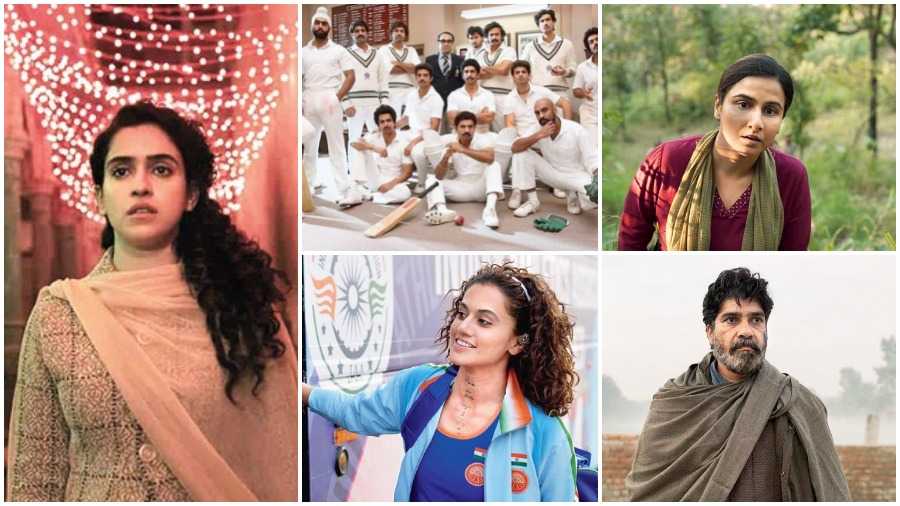
Pagglait
A young woman’s coming-of-age is catalysed by her husband’s sudden demise, and though much of Pagglait looked at death through a lens that’s rare in mainstream Bollywood, it didn’t make it the core of what it wanted to tell. Sanya Malhotra shouldered the Umesh Bist-directed film that hit the sweet spot in infusing humour into what was essentially a grim premise. The film scored in its succinct social commentary, casting a critical eye on age-old rituals and the growing practice of othering that’s unfortunately becoming a given in the times we live in.
A strong ensemble cast and authentic world-building stood the film in good stead. Sure, Pagglait fell victim to both formula and familiarity, but its treatment of grief and the way in which it showed a woman setting off on a path of discovering her true identity and making a corner in the world her own, makes it one of the better-made films of the year.
83
There has been many an attempt to showcase a sporting triumph on screen — some, quite successfully — but few have captured angst and frustration, euphoria and triumph as compellingly as 83. Kabir Khan’s dramatic yet sharp telling of Team India’s World Cup triumph of 1983, led by the redoubtable Kapil Dev, is a film that makes your hearts soar and your eyes well up. Everything about 83 — defined by its strong line-up of actors, the pick of the lot being Ranveer Singh as Kapil Dev and Pankaj Tripathi as team manager Man Singh — illustrates the power of the human spirit, educating even as it entertains, and giving us a film that’s for the ages. And yes, welcome back the big screen experience!
Sherni
“The strength of a woman has been redefined for me with this film,” Vidya Balan had told t2 in the run-up to the release of Sherni. Amit Masurkar’s film hinged on its female protagonists — both human and animal — baring their claws against an apathetic ecosystem in their struggle for survival. Vidya, as expected, led from the front, with Sherni emerging a powerful film on animal conservation and a scathing takedown of patriarchy, which, however, defied being put into a box.
Touching upon everything from corruption and cliquism to casual sexism, Masurkar — who had earlier directed the equally powerful Newton — imbued Sherni with a slow-burn feel that erupted into a tense thriller in its last 30 minutes. The film’s big win lay in how its idea ultimately became a thought. On how we need to make our voices heard, even if we don’t roar.
Meel Patthar
A beautifully written and powerfully acted drama, Meel Patthar, aka Milestone, traced the contemplative, almost poetic, journey of a truck driver — tellingly named Ghalib — trying to cope with the grief of his wife’s death and the potential loss of his job. Like his much-feted first film Soni, which focused on two women cops struggling to make their presence felt in a male-dominated domain, director Ivan Ayr based this film on yet another demographic which plays such an important role in our lives, but which almost remains invisible in the larger scope of society.
Avoiding melodrama or sentimentality, Meel Patthar scored with its muted tones and its air of melancholia and mystery, as well as a stellar central turn from Suvinder Vicky, who grounded the film in calmness as much as in a constantly churning core.
Rashmi Rocket
Taapsee Pannu rarely puts a foot wrong — she was A+ even in this year’s largely problematic Haseen Dillruba — and in Rashmi Rocket the actor put in some incredible footwork (as well as acting chops) to put gender bias in sport, specifically through the issue of hyperandrogenism, in the spotlight. The Akarsh Khurana directorial looked at a young woman racing past peer jealousy, institutional patriarchy and an archaic gender test to make her place under the sun, with Taapsee stunning with both her physicality and her now-familiar ability to slip into any part with ease. Rashmi Rocket may have floundered at times in tone and treatment, but Taapsee, always fighting the good fight on screen and off it, was faultless.
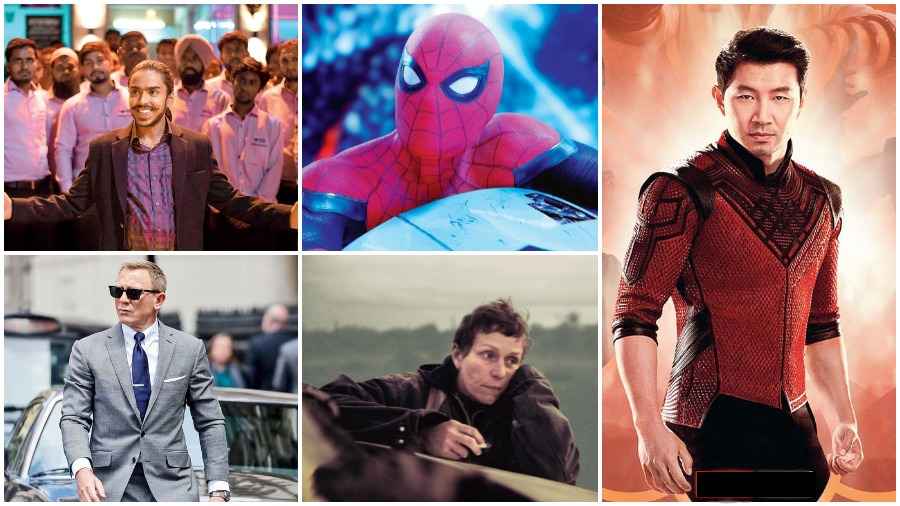
The White Tiger
Aravind Adiga’s eponymously named Man Booker Prize winner found its way to screen in this Netflix film. Grim and grimy, director Ramin Bahrani put his protagonist — Balram Halwai, played compellingly by Adarsh Gourav — front and centre to deliver a scathing commentary on the ever-increasing chasm between the haves and the have-nots and the fallout of a have-not doing all it takes — ugly, uglier, ugliest — to not only erase that divide but also wrest control from those who propagate it.
Benefiting from its dark, satirical treatment, crisp editing and atmospheric cinematography, The White Tiger boasted big names like Priyanka Chopra Jonas (who also did co-producing duties on this film) and Rajkummar Rao, but the film well and truly belonged to Adarsh Gourav, whose depiction of Balram’s grubby, conflicted humanity, earned him a BAFTA nomination no less.
Spider-Man: No Way Home
Storming into theatres in mid-December, the new Spider-Man film continues to write and rewrite box-office records. And with good reason. With Tom Holland reprising his role as the young webbed superhero, No Way Home does well in meshing humour and heart, scale and soul, to give us one of the most enjoyable superhero outings in recent years. Director Jon Watts hits a home run in not only balancing the breathless action with moments of quiet contemplation and grief, but also packing in treats big and small for
Spider-Man fans, including appearances from Tobey Maguire and Andrew Garfield, who have slipped into the Spidey suit previously, and classic villains popping in at regular intervals.
Cheekily self-aware, unapologetically heartfelt, and a thrilling ride from start to finish, No Way Home provides closure to some story arcs and delivers a special tribute to fans, reinforcing why
Spider-Man remains such a timeless hero.
Shang-Chi and the Legend of the Ten Rings
Luring audiences in droves into theatres in September — at a time when most people were, and still are, wary about re-dipping their toes into the community-viewing experience — Shang-Chi and the Legend of the Ten Rings gave a tottering global box office an unexpected shot in the arm, with the 25th film in the Marvel Cinematic Universe having an epic yet crowd-pleasing feel and packing in both great martial arts action and fun CG spectacle. It won hearts for its emotionally tinged origin story, neatly melding a fractured family’s intimate story into the largeness of the MCU.
Nomadland
Winning big — Best Picture, Best Director and Best Actress — at the Academy Awards this year, this intensely moving and deeply meditative portrait directed with clarity and conviction by Chloe Zhao but truly anchored by Frances McDormand’s essentially one-actor act, dissected the economic terrors of backwater America, ringing true even now as it did in 2012, when the film is set.
A film that tells us that real freedom means letting go, challenges us to take the road less travelled and holds out hope for a better tomorrow, Nomadland was distinguished by its languid pace, sombre yet never dismal look and feel and a lingering question of what longing and belonging truly means. The film may not cut ice with everyone, but McDormand — her wordless glances demand a film of their own — once again proves that she’s one of the best we have.
No time to die
Inordinately delayed because of Covid-19, Daniel Craig’s fifth and final film as James Bond hit theatres in September. No Time To Die, evoking both nostalgia and freshness, stood out for many things, but most of all for the most emotional and gut-wrenching finale of a Bond film in recent years. Director Cary Joji Fukunaga employed all the 007 genre conventions, including thrilling action set pieces, exotic locales, fan-pleasing moments and the Bond things we love, but tempered them with a touch of soul.
Craig, none the worse for wear, made No Time to Die a perfect swansong, with the film carrying an all-pervading end-of-an-era feel to it but also making us look forward to the future. Will the next Bond be black? Will it be a woman? Only time will tell.
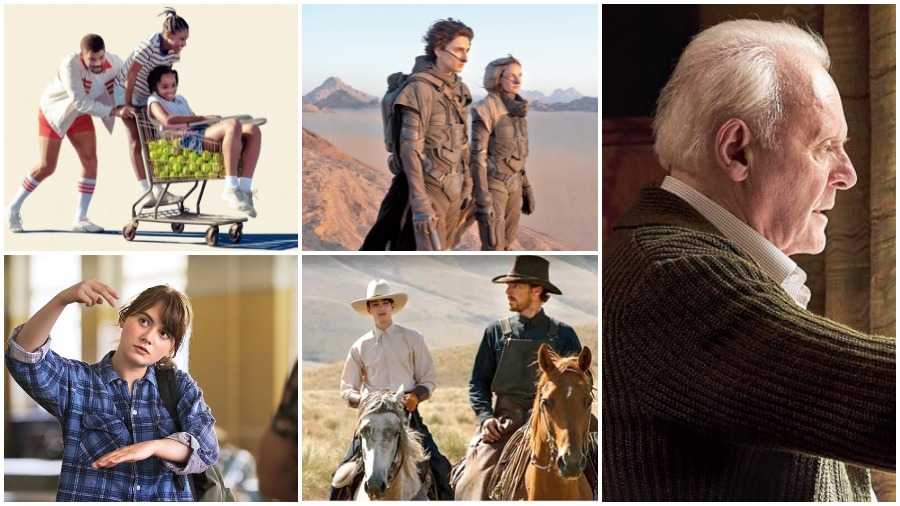
King Richard
Give Will Smith a well-written part (mostly of a father fighting against all odds) and watch him run with it. Remember The Pursuit of Happyness? Smith shines as Richard Williams, the father of real-life tennis champs Venus and Serena Williams in this part-biopic, part-drama, all-heart film, that many are saying could win the actor his first Oscar. Smith inhabits his character with masterful poise, elevating King Richard into a poignant and powerful film that has both feel and feel-good written all over it.
Dune: Part One
The epic becomes intimate and vice-versa in this long-awaited Denis Villeneuve film that is an aural and visual spectacle like no other. Dune boasted
jaw-dropping cinematic sci-fi, a world-building spectacle of epic proportions and a movie-watching experience that’s both thoughtful and thrilling, but at its core it was a coming-of-age story of a young man who stumbles upon an inheritance that he isn’t quite prepared for. A rousing score by Hans Zimmer, some exquisite world-building, from sandworms to stark spaces, based on Frank Herbert’s book and an as-good-as-it-gets cast make Dune: Part One (of course there is more) one of the best films in recent times.
The Father
The calendar mess-up caused by Covid-19 means that Anthony Hopkins has already won his Best Actor Oscar for The Father this year. Truth be told, this is a performance that deserves to be feted every year. Hopkins, now 83, stars as a patriarch battling severe dementia, but refusing to accept a caregiver. Hopkins, playing Anthony, delivers an act that is both profound and unsettling, with debutant director Florian Zeller making Anthony’s mind the canvas from which to tell this story.
Apart from being a gut-wrenching depiction of what dementia does to a once-alert mind, the film often metamorphoses into a thriller, using the trope of the unreliable narrator and Anthony’s own home which seems to have a mind of its own. Or does it? And then, of course, there’s Olivia Colman.
The Power of The Dog
Jane Campion returned after more than a decade to helm this Western that’s already an awards season favourite. Benedict Cumberbatch leads an ensemble cast in this creepingly sinister drama set in the 1920s that winningly combines fine production values and solid, but unsettling, psychological insights. To be fair, The Power of the Dog may not sit well with every member of the audience, but what powers it through is a career-defining turn from Cumberbatch and Campion’s brilliant but haunting film-making.
CODA
Emilia Jones’ brilliant central turn as Ruby — the only hearing member of her family — alone makes CODA (short for ‘child of deaf adults’) worthy of this list. Up for a couple of Golden Globes next month, CODA is a coming-of-age film that has its fill of warmth and humour, but its appeal truly lies in its rough-around-the-edges narrative. Best described as a love letter to one’s family, CODA is a fresh take on the familiar template of what is lost and what is gained by breaking away to find one’s own voice.


